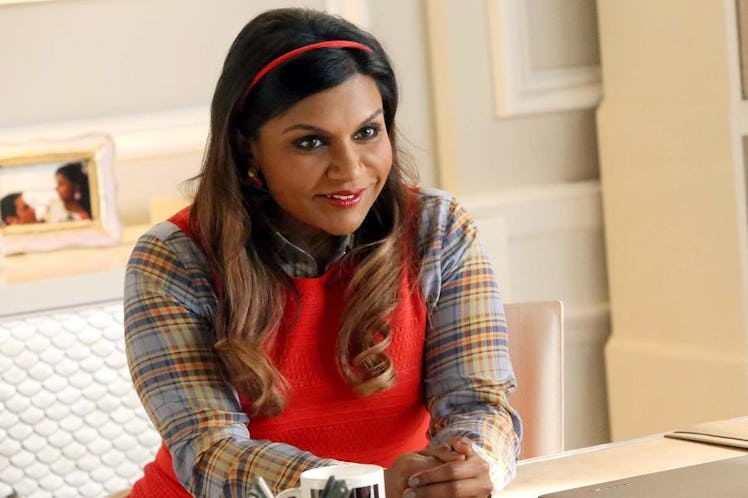
'The Mindy Project' Series Ending Marks A Change In Feminism On TV & We Are Grateful
With clear, determined intent, Mindy Kaling has revolutionized the trope of a female lead. Kaling's show The Mindy Project concluded on Nov. 14, and the sharp-tongued, quirky, romantic, feminist series was wrapped in flawlessly sloppy bow. The Mindy Project ending combined the full-circle happily ever after fans were expecting with the imperfect reality Kaling perfected over the years. This juxtaposition provided audiences with a satirical yet honest portrayal of everything that is right and wrong with classic romantic comedies. Mindy Kaling introduced the world to her female, woman of color lead – who was "not the sassy friend or nagging wife" – and changed the landscape of sitcom television with grace and wit.
Dr. Mindy Lahiri, Kaling's OBGYN character on the show, sets the stage for her hopeless romanticism in the pilot episode and carries that theme throughout the show. The ups and downs of every rom-com are threaded through the series, but with frayed edges and puckered seams. Mindy Lahiri proves women can be distressed without being a meager damsel in a lonely tower.
Throughout the show's six seasons, The Mindy Project's holds its fresh take on modern love and female empowerment. Audiences watch the characters grow in a natural way over the course of 117 episodes; there are no moments that leave fans thinking "Hm, eating that third bear claw seems out of character for Dr. Lahiri."
The series throws Mindy through the relationship ringer, as she tries on men like glass slippers. None fit right at the time of the relationship, and time and time again, the clock strikes 12 and Mindy finds herself a hot mess lying on her office floor until she takes change into her own hands.
In addition to brilliant one-liners, the only constant on the show is change. Three proposals, one baby, and one marriage later, the final season opens with Mindy realizing her marital mistake and filing for divorce. The need for a husband falls wayside and the focus makes a sharp shift to juggling single motherhood while managing and maintaining two careers.
The biggest "will they? won't they?" character is Danny Castellano (Chris Messina), Mindy's curmudgeon co-worker turned curmudgeon partner. They eventually "will" and have a baby together, move in together, go through the ups and downs of early parenting, and experience the ways having a child changes a relationship. From Mindy's perspective, we see her transition into independence and deep-rooted confidence. However, for the couple, those changes result in their downfall. In the middle seasons of the show, Mindy and Danny are both evolving, but they're on two different sides of the subway tracks.
However, over the years, as we learned in the finale, their tracks eventually converge and the concept of change is what brings them together. It's a messy happily ever after, but it's the one that drew audiences to the show in the first place.
We haven't seen a character like Mindy Lahiri before. She works hard, puts her job first, strives to be the best, doesn't take no for an answer, still feeds into her vices, all while successfully expanding her career — qualities that are traditional for a male lead, or perhaps Miranda from Sex and the City. However, Mindy is no Miranda. Yes, she can be bitter, but her bitterness is dusted with Beyoncé references and topped with a Wreath Witherspoon. It's Mindy's stereotypical feminine qualities and her desire to find love that became fundamental to the complex character.
And those complexities are what have catapulted both Mindys (Lahiri and Kaling alike) through TV's glass ceiling. Romantic comedies be damned, Mindy Kaling has forever changed any preconceived notions of sitcoms and female leads.
Check out the entire Gen Why series and other videos on Facebook and the Bustle app across Apple TV, Roku, and Amazon Fire TV.